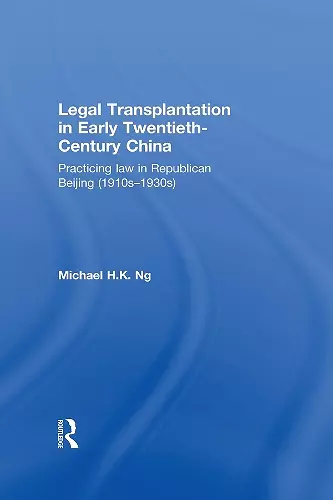Legal Transplantation in Early Twentieth-Century China
Practicing law in Republican Beijing (1910s-1930s)
Format:Paperback
Publisher:Taylor & Francis Ltd
Published:1st Jun '16
Currently unavailable, and unfortunately no date known when it will be back
This paperback is available in another edition too:
- Hardback£170.00(9780415713566)

"Practicing law"has a dual meaning in this book. It refers to both the occupational practice of law and the practicing of transplanted laws and institutions to perfect them.
The book constitutes the first monographic work on the legal history of Republican Beijing, and provides an in-depth and comprehensive account of the practice of law in the city of Beijing during a period of social transformation. Drawing upon unprecedented research using archived records and other primary materials, it explores the problems encountered by Republican Beijing’s legal practitioners, including lawyers, policemen, judges and criminologists, in applying transplanted laws and legal institutions when they were inapplicable to, incompatible with, or inadequate for resolving everyday legal issues. These legal practitioners resolved the mismatch, the author argues, by quite sensibly assimilating certain imperial laws and customs and traditional legal practices into the daily routines of the recently imported legal institutions. Such efforts by indigenous legal practitioners were crucial in, and an integral part of, the making of legal transplantation in Republican Beijing.
This work not only makes significant contributions to scholarship on the legal history of modern China, but also offers insights into China’s quest for modernization in its first wave of legal globalization. It is thus of great value to legal historians, comparative legal scholars, specialists in Chinese law and China studies, and lawyers and law students with an interest in Chinese legal history.
'This book provides a readable and clear account of the legal practices in the first three decades of the Republican era, which fills a gap in the legal history of China, and therefore much welcomed. Its archival research provides a new understanding of the period, by drawing attention to its process of assimilation of the traditional and Western legal systems.' —Song-Chuan CHEN, Assistant Professor, School of Humanities and Social Sciences, National Technological University, Singapore
‘Michael Ng's important study of the legal institutions of early twentieth century Beijing makes a major contribution to our knowledge of the legal order of Republican China. At the same time, it illuminates the complex interactions between the late imperial tradition, surviving in unexpected ways, and the transplanted institutions of liberal legal modernity.’ — Teemu Ruskola, Professor of Law, Emory University, U.S.A.
‘Ng’s point that older practices and expectations informed the conception and workings of modern police and legal institutions in early 20th-century China is an important one. In making this argument, Ng is contributing to a significant body of scholarship which has examined various ways in which the Republican judiciary continued to grapple with imperial precedents in civil and criminal law as well as in the organization of judicial institutions.... Ng’s book is notable for surveying a range of ways in which old and new policing and legal practices interacted in one city while demonstrating that these legacies facilitated the modern administration of justice while, at other times, presenting challenges to new institutions and professional groups as they struggled for legitimacy.’ — Frontiers of History in China, Volume 11, Issue 1, 2016
ISBN: 9781138698727
Dimensions: unknown
Weight: 350g
188 pages